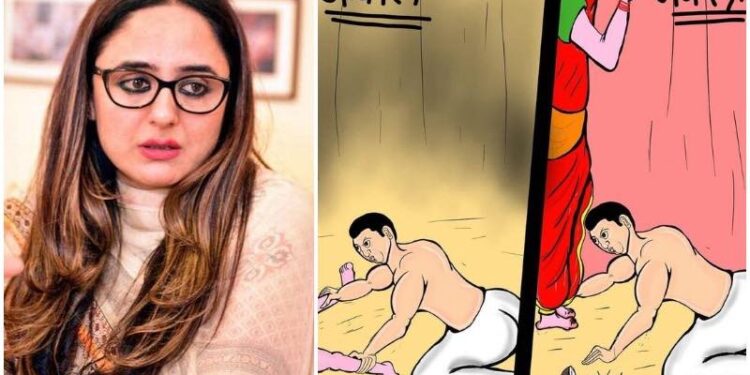Tanvi Akhauri
Lawyer Deepika Singh Rajawat, best known for representing the Kathua rape case in 2018, is caught in controversy over a cartoon she shared on social media. It showed how men worship female deities and revere women through the auspicious 9-day Hindu festival of Navratri and inflict violence on them the rest of the year. Rajawat posted the cartoon to Twitter with the caption “Irony.” The illustration, shared late on October 19, was a sharp comment on the hypocrisy of society towards women. Religious masses have taken offence at her tweet that, to them, is trying to deconsecrate their holy period. They have even gone so far as to demand her arrest.
This incident comes within a week of the gruesome killing in Paris, where Samuel Paty, a history teacher, was reportedly beheaded by an Islamic extremist for showing cartoons of Prophet Muhammad in class. Over in India, the outrage still appears to be thriving only in the virtual world but is gaining steam by the minute as fanatics demand Rajawat’s arrest. But what is Rajawat’s cartoon if not a reflection of the true state of India? Does it not capture accurately the society’s mindset towards the treatment of women? Are rapes an alien concept in India? Or is it that men who are religious have not been known to rape women?
Are people’s beliefs in their religions so weak-willed as to be threatened by a mere drawing? Have a look at it yourself:
Rising Intolerance Against Freedom Of Speech
Rajawat took to Twitter to announce that resulting from outrage over her tweet, a mob has assembled outside her house raising slogans against her. In a Facebook video from October 20, she also mentioned, “My intention was not to hurt religious sentiments. I did not abuse Goddess Durga. I have received calls and messages threatening me and my family members. But despite the controversy, I had the guts to let my tweet be. I did not delete it.”
The outrage against Paty and Rajawat may vary in consequence but are both indicative of a larger problem persistent across the world, that of growing intolerance and the shaky ground freedom of speech currently stands on. Personal faiths are gaining predominance over public domain behaviour, which could essentially endanger the personal freedoms and liberties of individuals. Should a person be punished for subscribing to an ideology that contrasts with another’s?
In Paris, such an attack was not the first. The precedent was first set in 2015, when terrorist organisation al-Qaeda gunned down people employed with the French satirical magazine Charlie Hebdo, for reportedly directing satire and cartoons at Prophet Muhammad.
And in India, the incident with Rajawat is not the first either. Not by a long chalk. Incidents such as these are common on social media every other day. Only recently, jewellery brand Tanishq was compelled to take down an advert endorsing Hindu-Muslim harmony after religious fanatics protested against it and threatened harm to the brand’s employees. Earlier in the year comedian Joshua Agrima was subject to massive trolling and faced rape threats. In 2017, hair stylist Jaweb Habib had to issue an apology for promoting his label with a cartoon of Hindu deities.
Does The Cartoon Not Depict The True State Of Women In India?
Communal disharmony can manifest in different ways through these, and a million other, circumstances. But let’s talk more about the cartoon’s content. I found it contains a rather straightforward yet profound comment that drives home the reality of violence against women in India. The place women occupy in the country is complex, with all the reverence reserved for goddesses and Bharat Mata while somewhere, every 15 minutes, a real, living, breathing woman is raped.
Rajawat has stood her ground as far as her views are concerned. “Do rapes not happen in India? If rapes didn’t happen in our country, Hathras, Unnao, and Kathua wouldn’t have happened. This is the side of society we turn ourselves away from… I pity such people.”
In India, many who supplicate before Goddess Durga during the Navratri, believe their daughters and sisters are reincarnations of her, think they are doing society a huge service by referring to women as “Ghar ki Lakshmi”, are the ones who violate the dignity of women year-round. Because treating women as second-class citizens can be made up for by calling them Durgas and Lakshmis, right?
Rajawat’s incident has shown, yet again, that double standards abound in India and we have mastered the art of turning a blind eye towards them.
A whole lot of hullabaloo has been created around the religious angle of the cartoon. But nobody is talking about the issue of rape it addresses. People are choosing to overlook it. Why? Because it’s a hard, uncomfortable pill to swallow? Because it’s a topic that needs swift, intelligent measures? Or because it faces a mirror up to the kind of people we have become? Think. You know the answer already.
(The original report was first published in Shethepeople).

















